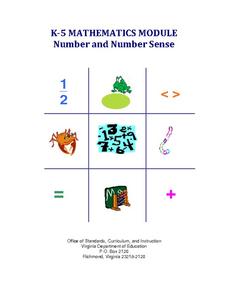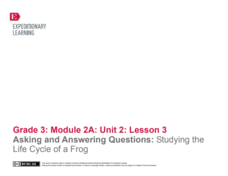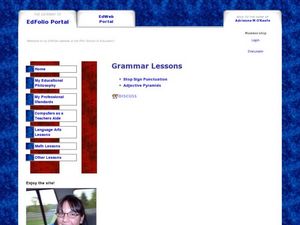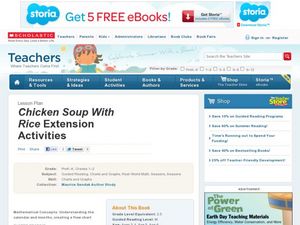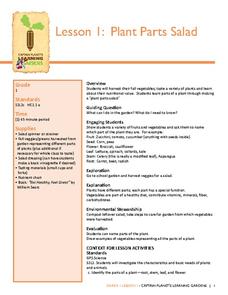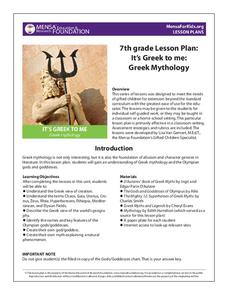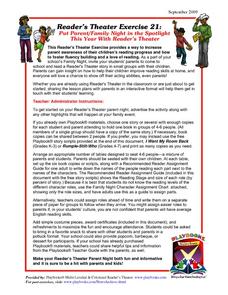EngageNY
Planning for Writing: Revisiting “Key Elements of Mythology” and Determining a Theme in the Myth of Cronus
Refresh my memory please. Scholars quickly read over the Myth of Cronus to refresh their memories of the story. They then get in groups and write parts of the myth on sticky notes that relate to the elements of mythology, sticking their...
EngageNY
Exploring Allusions to Myths in The Lightning Thief: Close Reading Part 1 of “Prometheus”
It's all just an allusion. Scholars learn the meaning of allusion and read an allusion in The Lightning Thief. Learners gather in their triads and discuss questions from the text to take a close look at vocabulary words and choose an...
EngageNY
Drafting Individual Readers Theater Scripts for a Specific Scene: Narrowing Text for our Readers Theater Scripts
Let's focus. In small groups, writers narrow text selections to produce a narrative script based on the novel Esperanza Rising by Pam Muñoz Ryan. Next, pupils plan their reader's theater scripts based on the text.
EngageNY
Synthesizing from Informational Texts: Main Idea and Key Details from Promises to Keep (Pages 8– 10)
Learners determine the main idea of a timeline on pages eight and nine of the text Promises to Keep. They use the timeline to complete a Main Idea and Details note catcher and then share their thoughts with the class. To finish,...
Curated OER
Going Graph-y
Second graders listen to and dicuss the story Where the Wild Things Are. They play a pantomime game and act out various feelings so their classmates can guess. They listen for the frequency of certain words, and record their findings on...
Curated OER
K-5 Mathematics Module: Number and Number Sense
Reinforce number sense with a collection of math lessons for kindergarteners through fifth graders. Young mathematicians take part in hands-on activities, learning games, and complete skills-based worksheets to enhance proficiency in...
Curriculum Corner
Valentine's Math and Literacy Centers
Look no further for a Valentine's Day-themed packet intended for math and literacy centers. Learners practice writing, reading, and representing numbers in a variety of ways, including skip counting by 2s, 5s, and 10s to 100. The pink...
CK-12 Foundation
Frequency Polygons: Constructing a Frequency Polygon
Connect the dots on frequency. Given a distribution table of scores on an assessment, learners create a frequency polygon by moving points on a graph to the correct frequency. The pupils use the display to answer questions about the...
EngageNY
Asking and Answering Questions: Studying the Life Cycle of a Frog
A lesson challenges learners to ask and answer questions about the life cycle of a frog. With a class read-aloud, partner discussion, and notebook reflections, scholars complete a three-page worksheet to prove their understanding of the...
California Department of Education
Studying for Careers
A lesson bridges the connection between studying and careers. Scholars complete a vocabulary worksheet in preparation for a discussion on study habits and career skills. Learners fill out another worksheet to identify which study habits...
Curated OER
Stop Sign Punctuation
Learners use punctuation and capitalization. In this grammar lesson students use stop signs in the place of periods. Learners cut out sentences and put stop signs in appropriate places. Students indicate capitalization where needed.
Curated OER
Chicken Soup with Rice Extension Activities
After reading Chicken Soup with Rice, by Maurice Sendak, incorporate some of these great extension activities into your lesson plan. Ideas include focusing on knowing the months of the year, or studying the illustrations and how they are...
Curated OER
Canada at a Glance
Stjudents examine the statistics in a Canadian publication for use in graphs. They develop their own questions based on tables and graphs found in this publication..
Curated OER
Compare and Contrast Nonfiction Texts
Explore nonfiction writing by comparing and contrasting two different texts. After reading two nonfiction books, articles, or magazines, students utilize a graphic organizer to record their similarities and differences. They answer study...
Curated OER
Interpreting and Displaying Sets of Data
Students explore the concept of interpreting data. In this interpreting data lesson, students make a line plot of themselves according to the number of cubes they can hold in their hand. Students create their own data to graph and...
Curated OER
Complexity Madness
After introducing the concept and formula for finding the area of a square, try this lesson. Fifth graders will use their prior knowledge to break apart various shapes in order to determine area. This lesson includes several examples,...
Curated OER
Calendar Time
Use circle time to work on counting. Kindergarteners practice the months of the year, say the full date, chart the day's temperature, count to 100, and sing the alphabet song. This kind of daily routine cultivates deep roots for...
Curated OER
Counting From 1 to 20
Children are given a mixed up number chart 1-20, and are asked to sort out all the even, odd, prime, and composite numbers. This worksheet is intended for 2nd grade but may not be suitable for learners under 10 or those who have not yet...
Captain Planet Foundation
Plant Parts Salad
How are vegetables beneficial to a healthy diet? Have kids examine different types of vegetables, such as zucchini, broccoli, and carrots, and determine which parts of the plant they represent. Then, they taste the vegetables as a class....
Evan-Moor
Daily Handwriting Practice: Traditional Cursive
Keep your class practicing handwriting each day in a 36-week school year with this comprehensive resource that combines daily cursive practice with content such as poetry, geography facts, continents, and much more.
Science Matters
Forms of Energy
The amount of energy Americans use doubles every 20 years. The first instructional activity in a 10-part series teaches scholars about different forms of energy. They rotate through five stations with hands-on activities or experiments...
NASA
Dark Matter NASA Conference
Young scholars calculate the escape velocity of planets in our solar system and use that knowledge to calculate the escape velocity for NGC 2300 group. They then suggest reasons for the escape velocity to be higher than possible given...
MENSA Education & Research Foundation
It’s Greek to Me: Greek Mythology
It's no myth: this packet on Greek mythology is an excellent addition to your social studies curriculum. With writing activities, such as short answer responses and biopoems, and reading activities, which include creation stories and...
Playbooks
Reader's Theater Exercise
Here's a great idea for your Parent/Family Night—host a Reader's Theater! Everything you need to organize the night, as well as a K-3 and a 4-7 script, is provided in the packet.







